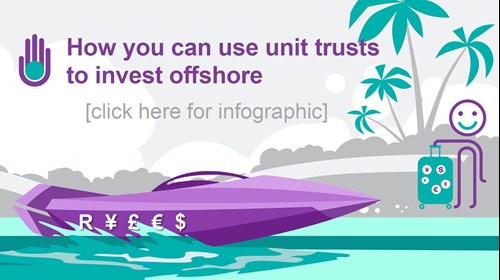
There are a few more steps involved and a bit more you need to know when you invest in an offshore fund that is domiciled in another country and held in a foreign currency instead of accessing foreign markets through a rand-based fund.
![]() But there are also benefits. You will own an investment in another country giving you diversification away from South Africa where it is likely your business assets, home and retirement savings are invested.
But there are also benefits. You will own an investment in another country giving you diversification away from South Africa where it is likely your business assets, home and retirement savings are invested.
An investment in a foreign currency can give you some protection against the long-term depreciation of the rand against major currencies.
If you want to invest money you have in South Africa in an offshore fund in a foreign currency, there are some things you have to comply with or do:
Funds approved for South Africans
When you invest in an offshore fund, the regulation and the way the fund can invest and buy or sell you units fund may differ from that of local funds.
![]() As a South African you are free to invest in any fund anywhere in the world, but as it is quite difficult to know how to do so safely, the South African financial services regulator, the Financial Sector Conduct Authority (FSCA), only allows offshore fund providers whose funds have been vetted by the regulator to market their funds to you in South Africa.
As a South African you are free to invest in any fund anywhere in the world, but as it is quite difficult to know how to do so safely, the South African financial services regulator, the Financial Sector Conduct Authority (FSCA), only allows offshore fund providers whose funds have been vetted by the regulator to market their funds to you in South Africa.
The FSCA approves offshore funds as suitable for South Africans if they:
Are authorised and supervised by a regulator operating in a country or area with similar laws to those in South Africa.
Offer funds to individual investors similar to investors in South Africa.
Have an office or a representative in South Africa that investors can contact.
Do not use derivatives to leverage the fund – essentially borrow to invest with the capability of losing more than the fund is worth. The derivatives must be covered at all times, which means the fund must be able to provide the shares or bonds or other security that is provided for in the derivative.
If a fund is not approved by the FSCA in terms of section 65 of the Collective Investment Schemes Control Act, then the management company cannot market it in South Africa nor can any South African or local entity “solicit” investments for that fund.
This means your financial adviser is not allowed to give you marketing brochures or application forms for these unapproved funds.
However, your adviser may be acting as a discretionary investment manager or be using the services of a discretionary investment manager, that is licensed to use its discretion to select and blend investments on your behalf.
 If you agree to allow, or specifically instruct, a discretionary fund manager to select the best offshore investments on your behalf, that manager can select an unapproved collective investment scheme.
If you agree to allow, or specifically instruct, a discretionary fund manager to select the best offshore investments on your behalf, that manager can select an unapproved collective investment scheme.
In this way, you may be invested in an unapproved fund but the discretionary investment fund manager will be responsible for selecting an appropriate investment and dealing with the foreign manager on your behalf.
An investment platform (or linked investment services provider) may not offer you an unapproved fund on its investment menu. However, if you, or your discretionary investment manager, want to invest in such a fund through the platform and the platform agrees to add the fund, it can be administered on the platform.
The fact that an offshore fund has not been approved by the FSCA does not necessarily mean the fund is not a good one – the fund may just not see enough benefit of going through the process of obtaining FSCA approval in a country where the investment market is quite limited.
However, the choice of offshore funds is vast and unless you are familiar with the regulation in the country in which the fund is registered and the track record of the manager, or you are being advised by someone who is, you are probably better off using a rand-denominated global fund or an FSCA-approved offshore fund.
Offshore with a local flavour
Some well-known South African fund managers have offshore funds that are based (domiciled) in other countries and denominated in offshore currencies. These funds are typically ones approved by the FSCA. This means you can deal with a familiar brand when investing offshore.
![]() Some fund managers manage offshore funds from South Africa, other South African managers have fund manager teams (analysts and managers) in other countries. Some local managers partner with offshore managers and outsource the management of their offshore funds to them.
Some fund managers manage offshore funds from South Africa, other South African managers have fund manager teams (analysts and managers) in other countries. Some local managers partner with offshore managers and outsource the management of their offshore funds to them.
Some South African professionals have been managing successful offshore funds from this country for years. However, be aware that international managers may have lower charges, longer track records and bigger teams analysing offshore shares, bonds and other securities than local managers.
